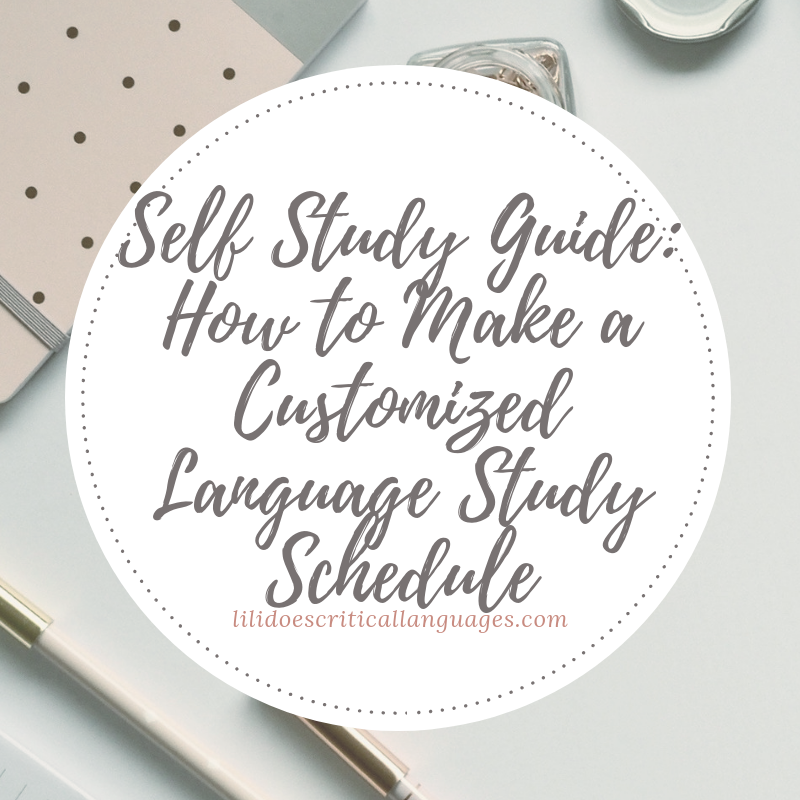Users Who Spiked

SELF STUDY GUIDE: HOW TO MAKE A CUSTOMIZED LANGUAGE STUDY SCHEDULE
Private Notes
Private Notes
Notes
It’s the bane of every language learner that wants to self study or study at home. If you are one of these self-learning warriors them you know what I mean. You have to create your own study schedule and plan your own curriculum and it can be a real P in the A. There are so many things to consider, such as your level, available time, your study style (which you can learn about here) and the goal of your learning. HOWEVER, despite all these variables, I am here to help you create your own customized language learning study planner that is both efficient and effective for YOU. So if you want to become a master study schedule maker, keep reading!
Calculate Your Hourly Study
Before you create your schedule begin by looking at your regular schedule (work or school) and determine how many hours per day you can study. Then calculate how many hours per week that makes. This will determine how much material you will be able to cover and how fast you will be able to get through it. The fewer hours of time you have available, the less content you will be able to learn over the span of a week. There is nothing wrong with this at all. Just have to say this clearly so that you don’t expect to be fluent in a few months if you only study an hour a day for five days. Don’t expect miracles people!
My Suggestions
If you work full time, I would suggest only studying about 30 minutes to one hour a day with review on weekends.
For people who have more time to study, you will be able to cover more content in the same week. However, make sure you aren’t adding too many hours so you don’t burn out. For those with more time, I suggest studying between 2-3 hours a day with review on weekends.
TLDR: Count hours because just like a regular language course, the amount of hours a week you study dictates how intense the course is and how much you will cover in a semester.
Determine How Many Days a Week You’d Like To Study
This part is ENTIRELY up to you! However, whatever you choose to do, make sure you leave at least one day of break to avoid burn out. I am currently doing 5 days a week of study with weekends off.
Choose Some Material
There is such a wealth of materials on the internet that I don’t recommend that you purchase ANY textbooks until you search the web to see if it is available online in pdf or something. That’s what I did. If you would like some free Japanese textbook pdfs, you can visit my post about free Japanese resources. I did find online a list of the best textbook by language:
Best Advanced Spanish Textbooks
Also need:
Memrise
Cram
Fluent-U
Yabla Chinese
Chinese Pod
Japanese Pod
Written Chinese Dictionary
TLDR: Do some research to find some material that will be best for you. DO NOT RELY ON APPS. THOSE ARE ONLY FOR DOWNTIME PRACTICE.
Create a Semester and a Syllabus (Get Creative)
The big cons of self-studying languages is the lack of organization. You have to do it alllll by yourself and it isn’t a basket a roses, believe me. So to make it easier for you, plan your studies in semesters like college courses. That way, you have more concrete and plannable goals. If you just float throughout the year as one continuous study blob, you’ll get bored, burnt out, and more likely to give up since your progress is not as easily trackable. But if you study by semester, you can set concrete goals for the semester and what you’d like to cover every day, week, and month. This way, you are easily able to track your progress. This is the best way to study, if you want to see real progress.
The other thing you need to do is create a syllabus, so once you’ve chosen your textbook and materials, go ahead and plan the WHOLE SEMESTER of what you will cover on what days, what days you will have tests, what days you will review, etc. This will require you to go through your textbook or online program in advanced to plan your studies. Try to plan each week by textbook chapters, program units, or specific subject you’d like to learn (celebrities, music, fashion, animals, etc) If you create a week where you are studying a specific subject, you can use movies, books, articles, youtube videos, or music to learn that subject!
For example:
Week 1: Korean From Zero Chapter 1 and 2/ Wani Kani 1
Day One: Blah blah
Day Two: Blah blah
Day Three: Blah blah
Day Four: Blah Blah
Day Five: Review Day!
Week 2: Korean From Zero Chapter 3 and 4/ Quiz
Day One: Blah blah
Day Two: Blah blah
Day Three: Blah blah
Day Four: Blah Blah
Day Five: Review Day!
Week 2: Desserts – Ms. Panda and Mr. Hedgehog Viki Tv Show
Day One: Blah blah
Day Two: Blah blah
Day Three: Blah blah
Day Four: Blah Blah
Day Five: Review Day!
Get creative! Your study schedule is whatever you want it to be!! Don’t forget to mark down the goals for the semester and what you’d like to be able to do by the end of the semester.
TLDR: Create your own semester-based plan to create concrete learning goals and trackable progress. Create a syllabus to write down your goals and your daily and weekly material to cover.
Figure Out Your Study Style
There are essentially two, which I talk about in an earlier post. The Systematic Style and the Intuitive Style. To find out which one you are, visit my post. Essentially, a Systematic learner would rather learn the concepts first, then practice them. An intuitive learner (such as myself) would prefer to be thrown in to an immersive environment and learn while immersed THEN learn the details of the concepts. This GREATLY effects how you need to approach your language study because you will need to develop specific language study skills. For example, if you are intuitive, you MUST have audio/video based lessons with explanations and you may not need a textbook at all.
TLDR: Find out what your language study style is and implement this style into your study syllabus
HOW TO ORGANIZE AND PLAN MATERIAL
One of the biggest problems among self-taught language learners, is staying organized. You need to be having fun with your studies, but it needs to be organized. Take a journey with me into hypothetical land. Imagine that you wanted to use kpop lyrics to learn Korean. So to do it, you choose a song to start and then everyday you sing the song over and over and study more and more of the lyrics till EVENTUALLY you learn the whole song. Then you choose another and start again. This sounds normal doesn’t it? It’s shouldn’t be. It’s bad.
What you SHOULD do is determine exactly how long you want to take to learn the lyrics to the song. For this case, we’ll say five days (an entire work week). For each day, you need to determine how much of the song you want to cover. One verse? Two verses? Then you plan that the LAST day (the fifth) day of your studies, you review all the vocabulary words and grammar you’ve learned. On Saturday or Sunday, you test yourself on the material.
Voila!! You’ve just created an ENTIRE study plan for a week just around a single K-pop song!! Stick that in your syllabus and move it along!
TLDR: Organize. Organize. Organize.
Use Material You’re Interested In
Keep in mind that you DO NOT have to only use your textbook or language learning program. The internet is vast and so are the resources, so don’t limit yourself! If you would like to learn about fashion, sports, science, or whatever, then plan a week or two of study where you use online resources to do exactly that! You can use movies, shows, articles, music, or even books. Whatever you want in the subject that you want in order to make your language study as interesting and less brutalizing as possible. So it’s okay if you suddenly take a break from your textbook study to learn a kpop song or watch an anime. Do what you want!
TLDR: Mix in topics and subjects you’re interested in learning about into your language study to help keep you interested in your language study!
Conclusion
I hope this wasn’t totally overwhelming! I know it’s a lot, but if you want real language progress, you MUST be organized. It doesn’t matter if you want to know how to study Spanish, Japanese, Chinese, French, German or whatever. You can use these study tips to help you no matter what the language or what the level. Use these steps and you will become a master schedule maker in minutes! I hope this helps!! Good luck with your language study!!!
All Steps:
Calculate Your Hourly Study
Determine How Many Days a Week You’d Like To Study
Choose Some Material
Create a Semester and a Syllabus (Get Creative)
Figure Out Your Study Style
HOW TO ORGANIZE AND PLAN MATERIAL
Use Material You’re Interested In
Comments
Please login to post comments on this story
-
Create a Semester and a Syllabus (Get Creative)
This is a fantastic idea. I always did very well in school and now that I am studying French and Italian on my own, I find I let myself get distracted. I will definitely have to try this technique. Thank you for sharing.






















